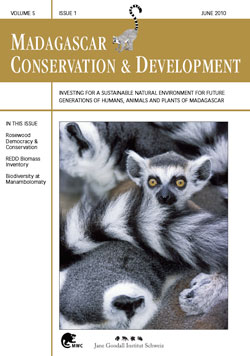Pillaging Madagascar for profit and political gain.
The latest issue of the journal Madagascar Conservation & Development provides a comprehensive look into Madagascar’s illegal logging trade, which has generated more than $200 million for a small group of individuals over the past year. The trade, which spikes just prior to national elections and may be a source of funds for ruling politicians, has taken a heavy toll on the lowland rainforests of Madagascar, with targeted species now at risk of extinction.
“Rosewood of Madagascar: Between democracy and conservation,” a paper by Hery Randriamalala and Zhou Liu, details the cycle of logging in northeastern Madagascar. Precious wood like rosewood is harvested on a nearly continuous basis despite a ban on logging. The logs are stockpiled until an “external event” such as a cyclone, an election, or political turmoil can be used as justification to lift the national export ban. The logging syndicate makes a fortune until opposition from conservation groups shuts down the trade—at until the next event.
“It is important to note that illegal exploitation continues throughout the entire cycle, as the government only really controls the export process (i.e., from the loading of containers on board a ship in port to its departure). Timber exporters accumulate stocks while waiting for a favorable phase in the cycle,” write Randriamalala and Liu.
“For some, the forest is a refuge of unique biodiversity, while for others it is simply an adjustable budgetary variable. And for others still, it is a source of personal enrichment.”
Randriamalala and Liu note the depletion of Madagascar’s forests by a small group of wealthy individuals comes at a high cost to Madagascar’s tourism industry, which brings in nearly half a billion dollars and is based largely around the island’s natural attractions, including endemic wildlife like lemurs and impressive landscapes like rainforests and coral reefs.
“Madagascar’s tourism industry annually brings nearly a half-billion US dollars to tens of thousands of people involved in all aspects of the industry (hotel and restaurant staff, guides, drivers, taxi operators, boat skippers, artisans and more).” they write. “By contrast, the illegal high – end timber industry has resulted in a one-time windfall of an estimated $ US 220 million for just twenty-three individuals.”
Nearly all the timber went to China.
Other papers in the issue cover the establishment of protected areas, lemur ecology, the Reducing Emissions from Deforestation and Forest Degradation (REDD) mechanism, and other issues relating to rosewood trafficking, including independent forest monitoring.
Madagascar Conservation & Development














